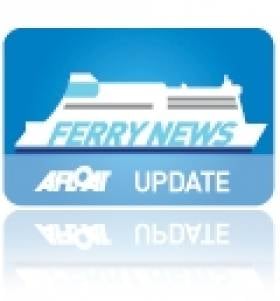Displaying items by tag: Goods
Haulier and Driver Found Guilty for Failure to Declare Dangerous Goods
#FERRIES–On 19th February 2008 the Stranraer Police were alerted to an unaccompanied freight trailer which had been off loaded from the Larne to Stranraer Ferry. The officers noticed that the trailer was giving off a strange odour and that it was not placarded. They confirmed with the loading terminal at Larne that the content of the trailer was declared as peat.
When the driver arrived at 8 o clock that evening he told the police that the cargo was aluminium smeltings known locally as "skulls", a by product from smelting and that it gave off dangerous gases and could go on fire if it got wet. He gave the police a copy of the manifest which confirmed that the freight was aluminium smeltings.
The shipper was Tinnelly International Transport, a road haulier who is no longer trading, but was investigated following an incident where an explosion occurred aboard an Irish Sea Ferry on 8th July 2007. During this earlier investigation it was revealed that there is no need to placard the trailer carrying this material under EU legislation while on the road, however under the International Maritime Dangerous Goods Code it must be declared to the shipping company and the trailer must be placarded for transport by sea.
At the Magistrates Court in Larne on Friday 2nd December 2011, Mr McGivern, the driver of the tractor unit that delivered the trailer to the Port of Larne, pleaded guilty to failing to declare a cargo of dangerous goods known as Aluminium Skulls and was fined £3,000 with contribution to costs of £1,000.
Tinnelly International Transport were found guilty of failing to declare the cargo and failing to placard the vehicle, and was fined £10,000 and costs of £6,000.
On summing up the magistrate, Mr Alcorn said:
I am satisfied beyond reasonable doubt that the charges are proved. It is only by the grace of God that something didn't happen. There might have been 500 lives lost.
The driver knew what he was transporting and he risked every life on the ferry.
Mr Alcorn compared the situation to that of the Princess Victoria which still resonates in Larne to this day. None of the guilty parties have set foot in this court in the lead up to this trial, whereas all the witnesses have been brought from Northern Ireland and Scotland because of a "couldn't care less attitude".
Captain Bill Bennett, Area Operations Manager ( Northern Ireland) for the MCA stated that
"This was a serious breach of the International Maritime Dangerous Goods Code with a cargo which is known to give off gases and to explode if it comes in contact with water. P&O Ferries had already banned the product for transportation on their vessels.





























































